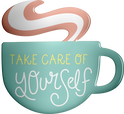
3 Elements of Mindful Self-Compassion:
1. Self-kindness - rather than ignoring our pain or beating ourselves up, we offer gentleness and the same tender loving care we would offer someone we love. We recognize that we are imperfect beings and allow for mistakes, failings, and flaws. We lovingly acknowledge the pain and suffering; rather than pushing it away or making it wrong, we offer comfort and nurturing.
2. Mindfulness - a way of being that allows us to be with our thoughts, feelings, and experiences without exaggerating or diminishing them, and without over-reacting or over-identifying with them. We maintain a little more objectivity as we become observers of this present moment. From a mindful place we are better able to respond rather than spin out in reactivity. We remember that we are not our feelings, we are not our actions, and we are most definitely not our stories. From this place we can see and be with what's here.
3. Common Humanity - We remember that all humans suffer and that others have felt the same way that we are feeling in a moment of pain. This alleviates the otherwise strong sense of isolation that says “I am the only one who's ever felt this way…” We remember the inherent messiness of life and of being human and we may feel a little less alone. Suffering is part of our shared human experience.
I've enjoyed several podcasts with Kristin Neff in the past couple of weeks (one that I liked for its simplicity was with Dan Harris on Ten Percent Happier). Through these talks I have been reminded that self-compassion is called for when there is suffering - it is a means to alleviate suffering. Not by letting ourselves off the hook or by excusing things we've done, but rather by acknowledging our humanity, which is messy and imperfect, and by offering compassion to that part of us that is hurting. We acknowledge the pain and suffering - we don't push it away. We see what has happened for what it is, without minimizing or exaggerating it.
Who Benefits from Self-Compassion?
Everyone benefits from self-compassion...those who practice it and those who are around them because it truly carries a positive ripple with it.
People who are especially sensitive, who feel deeply, care deeply, love with all their hearts, and walk around with an open heart, giving perhaps more than they have to give can especially benefit from these practices. Caregivers, helpers, nurturers, perfectionists. These are the people who carry the weight of the world, who feel responsible for everyone and everything, and who often forget to put their own care at the forefront. They could really use a good dose of self-compassion.
Why Practice Mindful Self-Compassion?
This isn't some life hack or a box to check - this is a deep practice to bring more compassion and healing to yourself, and therefore to those you love and to the world. The ripple potential is great. This is a genuine act of self-care, self-love, self-kindness which supports us in being more caring, loving, and kind in general.
What's interesting is that the more we practice self-compassion, the more we take responsibility for our actions. The more we are able to apologize. The more likely we are to forgive ourselves. We get unstuck because we have met ourselves with an open heart, letting go of the unfair and unrealistic expectation of perfection. We don't need to armor up to protect ourselves or lash out in defense. When we offer self-compassion we actually become more compassionate with others.
When do we need self-compassion?
Every day! Every time we feel a regret or we are hurting, self-compassion is available to us. Whether you've spilled soup on your favorite jacket (or person), forgotten a friend's birthday, missed a deadline, or did something to hurt someone else. When someone has hurt you. When you've received a scary diagnosis or you're terrified for someone you love. When a loved one has died or you're afraid they will. When you feel guilty or ashamed, when you wish you had known better or handled that interaction differently, it's time to gently acknowledge your human-ness and bring in some tender loving care. The medicine for all the woulda, coulda, shoulda's is mindful self-compassion.
As you can see the entry points of pain sit on a spectrum from what might feel mundane to what is clearly very severe. This isn't about comparing your pain to anyone else's (if you do, bring in some self-compassion). Your pain is yours regardless of how severe it is. If it hurts, tend to it. If it hurts a lot, tend to it a lot, and compassionately get some support.
How do we practice mindful self-compassion?
As in practicing self-care, begin by pausing and tuning in. Acknowledge what you are feeling, perhaps as you offer yourself a compassionate touch or gesture. Placing a hand on your heart, giving yourself a gentle hug, holding your own hand, or stroking your arm are all forms of compassionate touch - which one feels soothing and natural to you?
Say silently to yourself, "This is a moment of pain or suffering" (find the word that resonates and feels true in this moment). I feel _______ (angry, sad, scared, disappointed, hurt...)" whatever it is, name it. Here is where you become the observer or witness to your experience. You are with it, but it doesn't define or consume you. You are the person feeling the pain. You are not the pain or emotion.
Sit with yourself and allow yourself to feel it. Breathe as you do. Where do you feel it in your body? Often you might notice a sensation in your heart, gut, throat, shoulders, or jaw. Where do you feel it in your body in this moment?
Ask what this part of you needs to feel loved, comforted, nurtured. Offer that loving, nurturing, comforting care to yourself in the form of thoughts or touch. Remember the element of common humanity. You are not alone in your suffering. We all suffer - this is part of being human.
The practice of RAIN (Recognize, Allow, Investigate, and Nurture) is one that might support you in these moments. Tara Brach has many guided meditations, talks, and articles about RAIN if you would like to deepen your understanding and practice.
Where can you practice mindful self-compassion?
Really, anywhere, any time. This doesn't need to be a long, drawn-out, complicated practice. It can happen quickly, with a pause of a few breaths. It can happen in a meeting, in a crowded airport, in the middle of a conversation. It can happen with other people around or you might choose to make it a more extended practice when you have more time to be alone. Perhaps you take yourself to a special place in nature and allow the trees, rocks, water, and fresh air to support you. Or maybe you have a special room that feels soothing - go there and allow yourself all the time you need.
Your invitation…
How and where can you bring in a little more gentleness with yourself? Offer yourself self-compassion and grace? Remember your humanity? What might it be like to be less judgmental, less reactive, and to feel less alone in your moments of pain? What would it be like to stop beating yourself up and to trust that you've done the best you can?
What benefits do you imagine or know arise out of practicing self-compassion?
You do not have to go it alone or only practice self-compassion. It is a great act of care and compassion to seek support... from friends, family, coaches, support groups, doctors, or counselors. Please reach out for help when what you're facing is too much to face alone. Not sure where to begin reaching out? Maybe one of the resources here will be a good starting point.
What might the world be like if we each treated ourselves a little more kindly? I'd love to find out!
Resources for you
Kristin Neff's self-compassion website has a ton of resources, guided practices, and a self-assessment you can take if you'd like to get a sense of your current state of self-compassion.
This week's guided meditation is “Practicing with Self-Compassion.” Give yourself the gift of a few minutes to sit with yourself as you are for this practice. May it nourish and support you.
Also, on my Resources Page, you can find many free supports, including many for self-compassion, mindfulness, grief, and substance use disorder.


 RSS Feed
RSS Feed